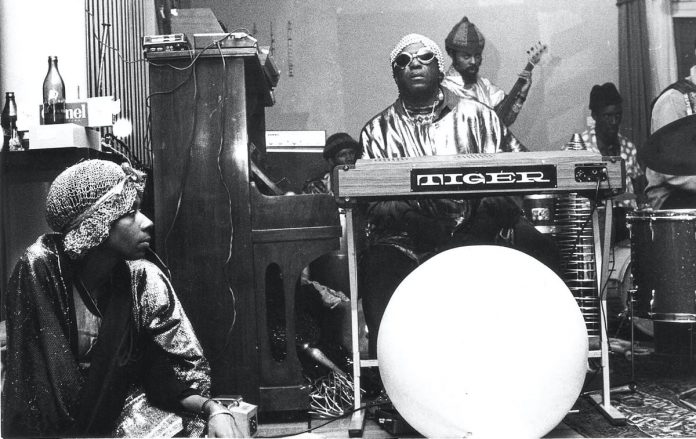Featured attraction of a concert at Seymour Hall in November was the band led by musician, philosopher and poet Sun Ra. An article on the man and his music appeared in our August 1966 issue but this was his first tour of England. Men long associated with his music, such as John Gilmore, Marshall Allen and Pat Patrick, were among the line-up and the party comprised twenty-two persons.
Sun Ra’s style was unmistakably his own, inevitably up-dated but very much in the tradition of the Saturn recordings. Currently the leader makes greater use of electronic effects, perhaps borrowing from Stockhausen but nevertheless filling his music with imaginative sounds and accents. The overlaying mood of romanticism still prevails but the balance between the staccato nature of the leader’s electrically inspired patterns and the more legato reed scoring is well judged. The solos by Gilmore and Allen were undoubtedly the most impressive and both displayed considerable control in the false upper register.
The real point is that Sun Ra does not offer a jazz concert. Instead we are treated to Black vaudeville of a 1970 vintage. Mixed media devices are employed and, in addition to the obligatory light show, there are poetry interludes, dancers and even a moral incantation from Sun Ra himself. His two baritone men, Pat Patrick and Danny Thompson, meander around the hall and, in so doing, provide a unique form of stereophonic effect as they stroll together and apart. The music, however, is very modern and best described in jazz terms. There are passages of exciting free blowing but a predominantly organised air remains. Great care has obviously gone into the arrangements and the band’s penchant for detailed rehearsal has certainly paid off in terms of group empathy. Only in the purely percussive passages is there a suggestion of the individuals going their own way.
Also in the programme were Osibisa, the most rhythmically advanced and exciting rock group I have heard. Despite an attacking trumpeter and rumbustious tenor saxophonist, they have few jazz pretensions. They are also a little short on harmonic sophistication but more than compensate for this by the way in which they encourage a rich, rhythmic interaction between their individual members.
Completing the show were the Chris McGregor Quintet plus two, masquerading under the title of Jungle Juice. No disguise was evident in the music and Louis Moholo led a three man percussion team with skill and imagination. Once suitably amplified Dudu Pakwana and Mongezi Feza soloed impressively with the latter, in particular, playing as eloquently as I have ever heard. McGregor was his usual fiery self and the group performed the difficult task of warming up the audience with jazz that was loose-limbed and inventive.
















